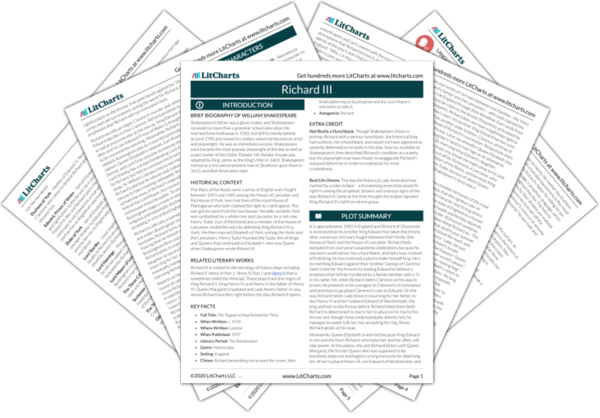Summary
Analysis
At Baynard's Castle in London, Buckingham reports to Richard that the citizens reacted to the rumors Buckingham spread with complete silence, and that they remained mute "like dumb statues or breathing stones" even when Buckingham called on them to cry "'God save Richard, England's royal king!'" Buckingham then made the Mayor recount his message for him but rather than delivering the message as his own, the Mayor introduced it as what "the duke" said. The people stayed silent except for a few of Buckingham's supporters in the far back who cried approval. Buckingham thanked the crowd for "this general applause and cheerful shout" indicating their support for Richard.
The citizens' silence speaks volumes – though they are too scared of what might happen to them if they articulate resistance to Richard, their refusal to cheer for Richard expresses that resistance as audibly as booing would. It doesn't matter whose mouth the news of Richard's rise comes from – Buckingham's or the mayor's – the public will not celebrate it. The mayor's careful choice of words distances him from the message Buckingham makes him announce and implies he, too, inwardly, resists Richard. This is an example of the commoners wishes rising up to effect those in power, and these are the first rumblings of resistance to Richard's rise and a signal that he can lie his way to power, but perhaps not lie his way to keeping it.
Themes
Literary Devices
In light of the public's reaction, Richard and Buckingham contrive to make it seem to the public that Richard does not want to be king and only accepts the crown at others' urging. As the Lord Mayor, Aldermen, and Citizens enter looking for Richard, he departs, leaving Buckingham to greet them. Buckingham pretends he, too, has come to visit Richard.
Determined to empower himself with the public's support, Richard changes tacks (as he does whenever he's not winning an argument). Instead of proclaiming his triumphant rise to the throne, he will instead pretend to be a modest, humble man lacking all personal hunger for power.
Themes
While Buckingham talks with the Lord Mayor and others, Catesby enters with a message for Buckingham from Richard stating that Buckingham should visit on another day because Richard is currently deep in holy prayer. Buckingham sends Catesby off to press Richard to meet with them. Buckingham observes to the visitors that Richard is holy and virtuous, not lazy and hedonistic like King Edward was. Catesby returns reporting that Richard is still hesitant to meet them. Buckingham insists.
Ever the director, Richard has staged a mini-play within the play: he and Buckingham will proceed to act out a (false) version of reality in which Richard is a god-fearing, self-effacing man whereas King Edward (and, by extension, his son and contender for Richard's throne, Edward Prince of Wales) was sinful and self-indulgent.
Themes
Richard enters in a gallery above, flanked by two Bishops. Catesby returns. Buckingham points out to the other visitors how religious Richard is. He then entreats Richard to take the throne, "your due of birth" which will otherwise be given "to the corruption of a blemish'd stock." He paints England as a sick body that only Richard can heal. Richard defers, claiming to be too modest and unworthy to take the throne and that, besides, there is Edward Prince of Wales to take it. Buckingham protests that the Prince is illegitimate and that, though Richard is kind to him, the people will never stand for him to rule. The Mayor and Catesby join Buckingham's entreaty. Richard finally relents, though he insists "God doth know, and you may partly see, how far I am from the desire of this." All cheer a blessing, set the coronation date for tomorrow, and exit.
The climax of the mini-play is also the climax of the play: Richard claims the crown while lying spectacularly. He, the godless, bloody murderer, affects the persona of a saintly man of virtue whose spiritual elevation is echoed by his physical elevation in the gallery. He, who ruthlessly chases power, pretends to want nothing to do with the throne and to accept it, grudgingly, as a favor to the public. The mayor and his party, the audience for Richard's play, seem, by their cheered blessing, to be convinced by Richard's performance.
Themes
Literary Devices
Get the entire Richard III LitChart as a printable PDF.













